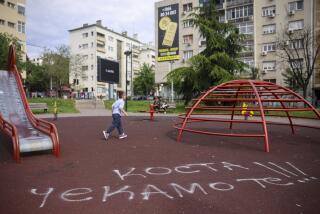Army Must Remain in Croatia, Serbia Says
BELGRADE, Yugoslavia — Serbia said Friday there is no way the federal army can pull out of Serb-dominated areas of Croatia, apparently scotching the latest European proposals to bring peace to the secessionist republic.
The strong statement came from the remnants of Yugoslavia’s federal presidency, now run by Serbia, as well as its ally Montenegro and two Serbian-controlled autonomous provinces.
The statement declared that it is “absolutely unacceptable” for federal troops to abandon ethnic Serbs in Croatia “because this would expose them to physical liquidation.”
The statement, coupled with a blunt denial by the army that it had signed any agreement to withdraw from Croatia, deflated hopes that had been raised by a reported peace pact Thursday.
More than 1,000 people have been killed in fighting between Croats, the Serb-dominated Yugoslav army and minority ethnic Serbs who want no part of an independent Croatia. The civil war began after Croatia declared independence June 25 along with neighboring Slovenia.
Past agreements on Croatia have broken down because of differing interpretations by the warring parties. Fighters on the battlefield also have ignored pacts negotiated by their leaders.
While the political negotiations faltered, the army and Croatian forces made some moves Friday toward easing hostilities. The federal forces began lifting a blockade on the Croatian port of Zadar, and the Croats began removing barricades outside a federal barracks in the republic’s capital, Zagreb.
Dutch Foreign Minister Hans van den Broek announced Thursday in The Hague that the army had agreed to pull out of Croatia in a month if Serbs and Croats could reach the political settlement that has eluded them for more than a year.
A Dutch Foreign Ministry spokesman said Friday that no official declaration was signed, “but it was clear that all parties committed themselves to the agreement.” He spoke on condition of anonymity.
Van den Broek spoke Thursday after meeting with Presidents Franjo Tudjman of Croatia and Slobodan Milosevic of Serbia as well as Yugoslavia’s defense minister, Gen. Veljko Kadijevic.
He said the combatants also agreed to address the grievances of the Serbian minority in Croatia, and that there would be no unilateral border changes. Rebel Serbs, helped by the Yugoslav army, have captured more than one-third of Croatian territory.
Ethnic Serbs in Croatia’s Krajina region also demanded Friday that the Yugoslav army stay in their region, asserting that they need protection from Croatian forces.
Serbia and the ethnic Serbs in Croatia fear an independent Croatia could bring a return of the oppression produced by the Croatian-run Nazi puppet regime that killed tens of thousands of Serbs in World War II.
Serbia has said for several months that Croatia is free to secede but only if Serb-populated areas gain the right to self-determination. Croatia refuses any change in its present borders and fears that Serbia wants to expand its territory at Croatia’s expense.
In eastern Croatia, the scene of some of the heaviest fighting in the last three months, shells rained down on a convoy that the army and the Croats had agreed to allow into the Croatian stronghold of Vukovar. The town has been under siege from Serbs and the army for 50 days. There were no immediate reports on casualties.
Croatian radio said the city of Osijek in eastern Croatia came under artillery attack from ethnic Serbian rebels before dawn.
Well-known poet Milan Milisic, 50, and his wife were killed when a bomb hit their house on the outskirts of Dubrovnik. Milisic was a prominent anti-Communist dissident and an independent publisher.
More to Read
Sign up for Essential California
The most important California stories and recommendations in your inbox every morning.
You may occasionally receive promotional content from the Los Angeles Times.










